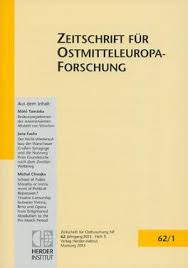Arbeitswelt, Lebenswelt, industrielle Machtverhältnisse. Zum Konzept des sozialwissenschaftlichen Funktionalismus am Beispiel der Tschechoslowakei 1945-1968
Working Environments, Living Environments and Industrial Power Relations. The Sociological Concept of Functionalism and the Example of Czechoslovakia, 1945-1968
Author(s): Peter HeumosSubject(s): Political history, Social history, Labor relations, WW II and following years (1940 - 1949), Post-War period (1950 - 1989)
Published by: Verlag Herder-Institut
Keywords: Working Environments; Living Environments; Industrial Power Relations; Sociological Concept of Functionalism; Example of Czechoslovakia; 1945-1968;
Summary/Abstract: This article applies the categorizations of systems theory to the everyday behaviour of workers and the works council movement in Czechoslovakia between 1945 and 1968. Its central aim is to investigate the ways in which this theory handles socialist alternatives to State Socialism, such as the works council movement. Overall, when seen from the perspective of systems theory, the characteristics of this movement do not lend themselves to the construction of a society conforming to the theory’s structural requirements. The radical egalitarianism of the works councils with regards to wages policy sets it in opposition to the (empirically untenable) systems theory thesis which regards performance alone as authenticating the functional differentiation of wage relations; the council’s efforts to level existing hierarchies run counter to the assertion of the indispensability of a hierarchically structured social system, and the democratization of power relations within the factories as practised by the works council was rejected as adversely impacting upon operational performance. This latter point demonstrates that systems theory is based upon a hierarchical ranking of values in which the controlling resources of the system have priority over socially-constructed contexts of interpretation, and that it is indifferent towards emancipatory moments since they cannot handle the concept of “control”. As a hybrid consisting of structural elements from both socialist and market-constituted societies, the works council movement therefore falls through the terminological net of systems theory. Like State Socialism, is does not adhere to the demand within this theory for a functional differentiation between economics and politics. Although systems theory has a high opinion of the cognitive value of its own insights, highlighting that these have been drawn from various heterogeneous situations, its arguments remain firmly embedded within the framework of a Fordist model of production, as is clearly demonstrated by its insistence upon the functional differentiation between the world of work and that of everyday life. The reshaping of the working environment by the Czechoslovakian working class as a result of concerns arising from the living environment is portrayed by systems theory as a major factor contributing to the collapse of State Socialism, since it served to disincentives performance. This scenario only appears plausible, however, because it does not recognize that the transition to a post-Fordist model of production in modern society has been accompanied by an increased blurring of the clear differentiation between the working and living environments.
Journal: Zeitschrift für Ostmitteleuropa-Forschung
- Issue Year: 63/2014
- Issue No: 3
- Page Range: 341-373
- Page Count: 33
- Language: German

